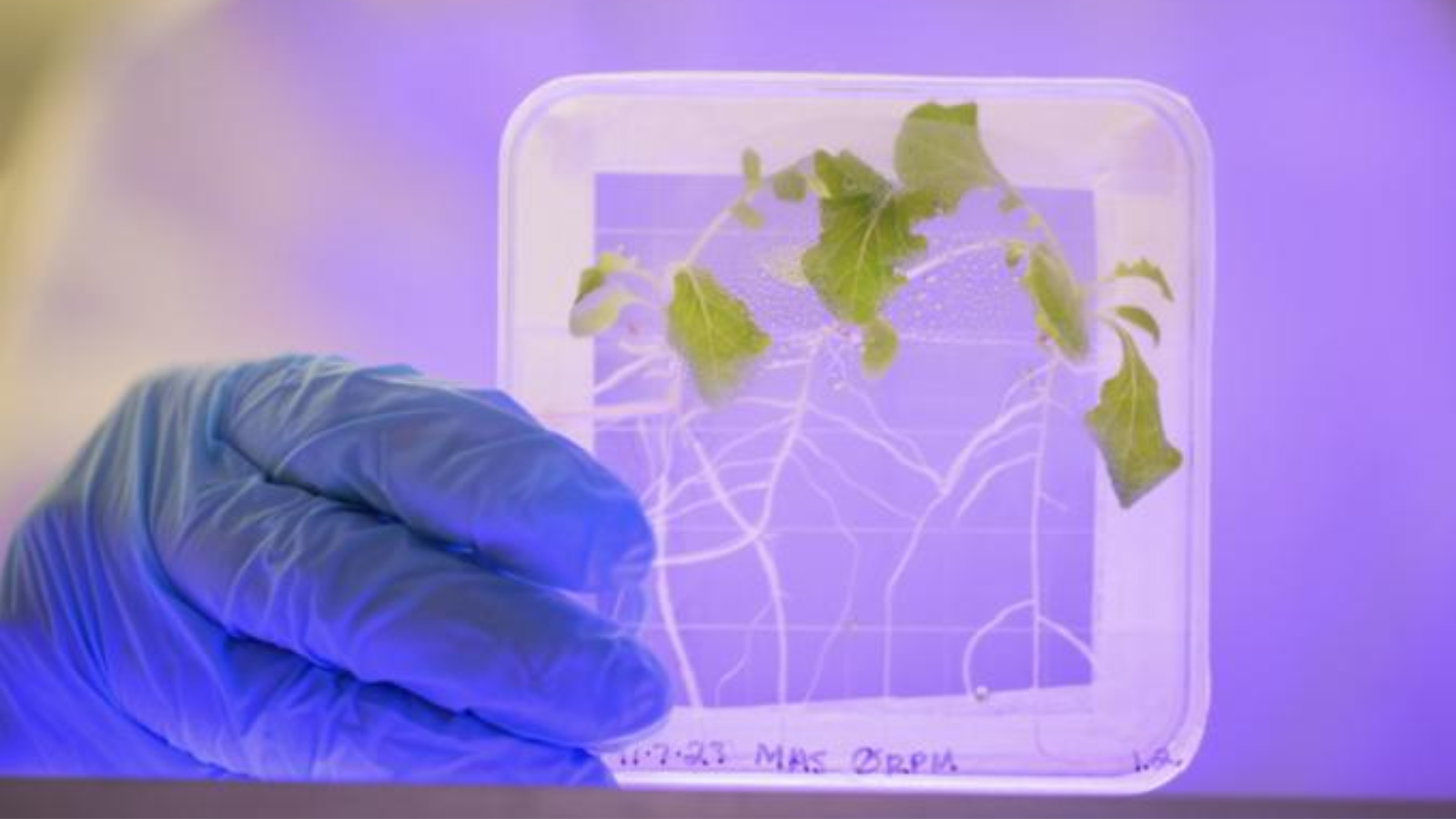
Though lettuce and other leafy salad vegetables are crucial parts of a balanced diet, a literal "rocket salad" may not be the healthiest choice for astronauts aboard the International Space Station (ISS).
New research has shown that microgravity, the condition in which ISS astronauts live, can make lettuce more vulnerable to pathogens — organisms that can sometimes lead to the outbreak of foodborne illnesses. The research could have a pretty big influence on future crewed space missions to the moon and, eventually, to Mars.
Currently, ISS crew members can eat salad greens that have been grown on the space station in temperature, water and light-controlled chambers. They can also eat items sent to orbit from Earth. However, the ISS has been known to host a lot of pathogens, like bacteria and fungi, that can cause disease. And if some of these pathogens, like E. coli and salmonella, colonize the tissue of eaten lettuce, the consumer can get sick.
Though bacteria can grow anywhere, so contamination is always a risk, NASA and other space agencies as well as private space companies like SpaceX are concerned that an outbreak of a foodborne illness could seriously derail a mission and jeopardize billions of dollars of investment.
Salad doesn't put up a fight in space
Scientists with the University of Delaware aimed to discover precisely how microgravity affects lettuce, and whether the environment can make salad vegetables more or less vulnerable to illness-causing organisms. They achieved their results by exposing the plants to rotation created by a device called a clinostat. This simulated ISS microgravity conditions for the samples.
Plants can sense gravity using their roots, and often display a type of differential growth called "gravitropism" as a result of how gravity pulls on them. The team ultimately found that plants grown in microgravity-simulated environments were actually more vulnerable to colonization by the pathogen Salmonella.
Tiny pores in stems and leaves are called "stomata," and plants use these stomata to exchange gas. As a defense mechanism, the pores usually "close," in essence, when a plant is exposed to a stressor like bacteria.
For some reason, however, planets grown in rotation-induced microgravity opened their pores when exposed to bacteria, meaning they were much more prone to salmonella invasion in space than they would be on Earth.
"The fact that they were remaining open when we were presenting them with what would appear to be a stress was really unexpected," Noah Totsline, team member and a scientist with the University of Delaware, said in a statement.
Even though the plants were spinning at speeds no greater than what's experienced by a rotisserie chicken — aka this wasn't true microgravity — it was enough to confuse their sense of directionality and to affect their responses to stressors like bacteria.
"In effect, the plant would not know which way was up or down," Totsline said. "We were kind of confusing their response to gravity."
The team also used their experiment to test the use of a "helper bacteria" called B. subtilis UD1022, which is used to assist plant growth and defend against bacterial colonizers.
Rather than help plants fend off salmonella in microgravity, the team found that UD1022 failed to protect plants, which may be the result of the bacteria being unable to trigger a biological response that would cause the plants to close their stomata.
"The failure of UD1022 to close stomata under simulated microgravity is both surprising and interesting and opens another can of worms," Harsh Bais, team member and a plant biologist at the University of Delaware, said in the statement. "I suspect the ability of UD1022 to negate the stomata closure under microgravity simulation may overwhelm the plant and make the plant and UD1022 unable to communicate with each other, helping Salmonella invade a plant."
The team has an idea, however, that could help offset the risk of contamination as a result of plants opening their stomata wider in microgravity environments.
"Starting with sterilized seeds is a way to reduce risks of having microbes on plants," Kniel said. "But then microbes may be in the space environment and can get onto plants that way."
An alternative could be to tweak the plants' genetics to prevent them from opening their stomata wider while in space in the first place. Scientists at Bais' laboratory are already evaluating different lettuce species with varied genetics and testing their response to microgravity.
"If, for example, we find one that closes their stomata compared to another we have already tested that opens their stomata, then we can try to compare the genetics of these two different cultivars," Bais said. "That will give us a lot of questions in terms of what is changing."
The team's research was published this month on the Springer Scientific Reports website.







